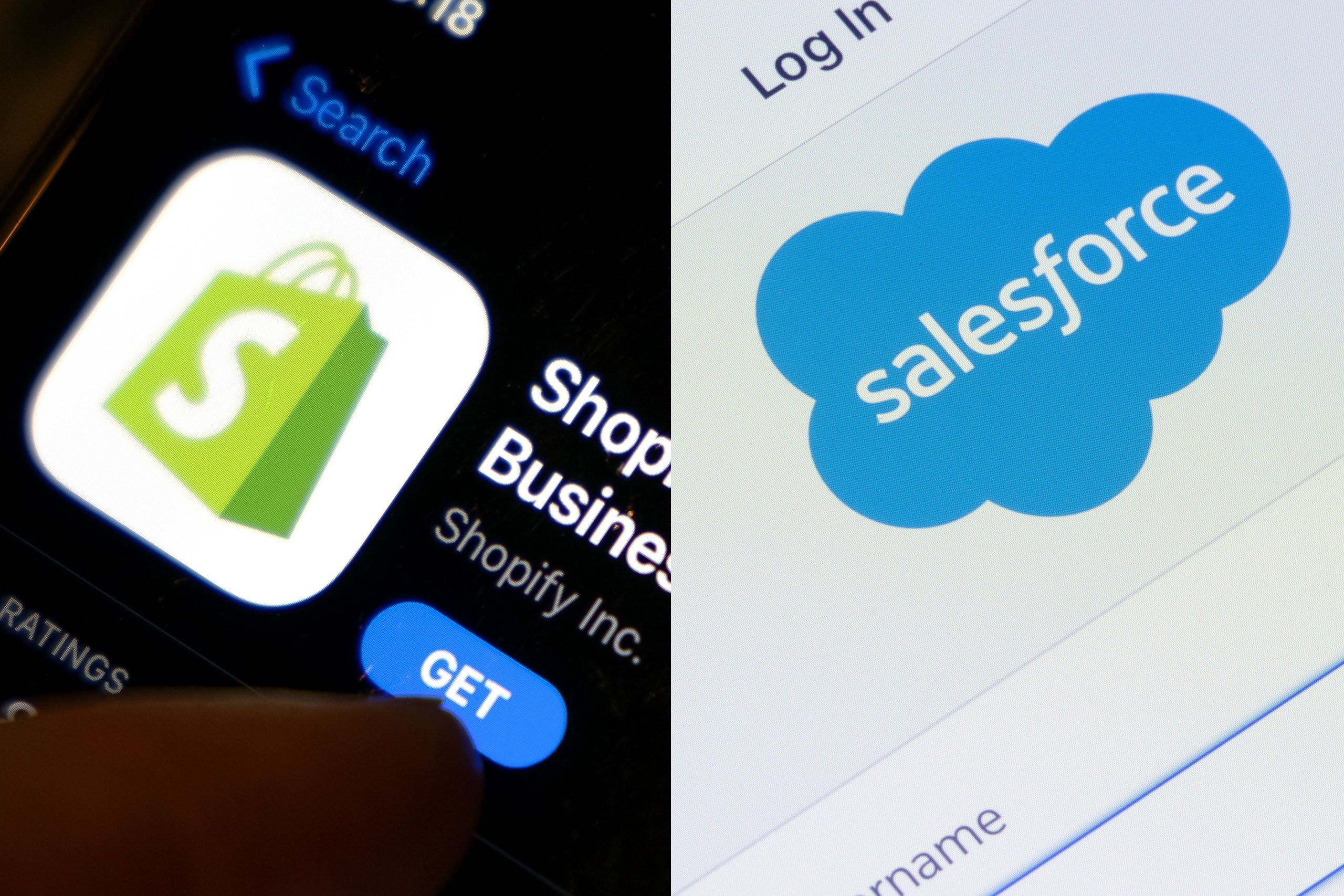
If you’re looking for a new eCommerce platform, chances are you’ve explored Salesforce and Shopify. Salesforce Commerce Cloud (SFCC) B2C boasts robust scalability, flexibility and advanced merchandising, yet faces challenges such as high ownership costs and a limited ecosystem. Conversely, Shopify Plus offers lower ownership costs, streamlined maintenance, and extensive integrations, promising affordability and scalability, but less flexibility than SFCC for merchants seeking eCommerce growth.
Opting for Shopify over SFCC may unlock tailored features and cost-efficiency that could reshape your bottom line. However, it’s essential to evaluate how each platform aligns with your objectives and budget. Ultimately, the goal is to embrace a solution that seamlessly aligns with your objectives and budget.
In this post, we’ll delve into Shopify and Salesforce to help merchants determine the ideal platform to propel their businesses forward. Need a more customized answer? Contact InteractOne for expert help today.
Shopify vs Salesforce Commerce Cloud (B2C): At a Glance
| Aspect | Shopify | Salesforce Commerce Cloud |
| Key Features and Capabilities | – Easy-to-Use Interface – Multi-Channel Selling – Extensive App Store for Customization – Seamless Payment Integration – Built-in Marketing Tools | – Multi-Channel Commerce – Unified Commerce Experiences – AI-Powered Personalization – Robust Order Management – Scalable and Secure Platform |
| Common Pain Points | – Limited Customization Options for Advanced Needs – Transaction Fees for External Payment Gateways – Scalability Challenges for Large Businesses | – Complexity in Implementation – High Initial Investment – Steep Learning Curve for Customization |
| Advantages | – Ease of Administration – Extensive App Ecosystem – Wide Range of Integrations – Rich Design Themes | – Enterprise-Level Scalability – Advanced Personalization Capabilities – Flexibility – Comprehensive Order Management System |
| Cost Considerations | – Licensing / Subscription Fees / Development Support – Transaction Fees (for non-Shopify Payments) – App Costs for Additional Functionality – Theme Customization Expenses | – Licensing / Subscription Fees / Development Support – Implementation Costs – Customization and Integration Costs – Ongoing Support and Maintenance Expenses |
| Cost-Effectiveness | Generally lower initial investment and ongoing costs, suitable for small to medium-sized businesses | Higher initial investment and ongoing costs, suitable for large enterprises |
Pricing Comparison
Salesforce Commerce Cloud’s Pricing
Salesforce Commerce Cloud (SFCC) sets its prices on a per-client basis, so we can’t share exact numbers. But let’s take a peek at what it might cost. Imagine you’re a merchant making about $20 million a year. Just for the license to use SFCC, you might need to pay anywhere from $200,000 to $600,000 every year. For larger enterprises making even more money, those fees could go up to millions yearly. And the development costs associated with getting everything set up in the first place? That could cost between $500,000 to $1.5 million.
Shopify’s Pricing
On the other hand, Shopify keeps things more straightforward with its pricing. The basic Shopify Plus package starts at $2,000 each month for stores making less than $800,000 monthly. If your store brings in more, they’ll charge an extra 0.25% of what you make above $800,000. You might pay extra each month for apps, which could range from $1,000 to $5,000. Getting your store set up in the first place could cost between $80,000 to $300,000. Also, there are regular yearly costs of $60,000 to $180,000 for ongoing business needs.
Our Recommendation
When we tally up the expenses, Shopify Plus tends to be considerably more budget-friendly than Salesforce Commerce Cloud. This difference in cost makes Shopify Plus a compelling option for many merchants, especially those wanting to save money without sacrificing quality and growth potential.
Salesforce Commerce Cloud
Strengths
Scalability: SFCC is capable of handling both growth and sudden increases in demand. With its fully managed software-as-a-service (SaaS) model and top-notch quality assurance, it provides peace of mind, especially for complex businesses.
Production & Merchandising: SFCC offers strong merchandising features right out of the box. It includes powerful visual merchandising tools and AI-powered personalization through its Einstein engine, giving businesses the tools they need to succeed. SFCC also comes with promotional tools and supports various product types, like bundled products.
International Capabilities: The multi-store setup gives merchants precise control over products, prices, merchandising, and themes across different storefronts. This setup simplifies managing international operations, making it easier for brands to run multiple stores efficiently.
Native Features: SFCC includes built-in support for a variety of features like gift cards, product bundling, powerful search tools, staging and testing environments, advanced order management, and seamless social media integrations. These features are designed to meet the needs of enterprise-level businesses effectively.
Flexibility and Customization: While SFCC may not be as flexible in back-end customization as some platforms, its extensibility makes up for it. SFCC allows for extensive customization, though it may come at a price. It particularly shines in product attribution and catalog management, distinguishing itself from other platforms.
Are you considering migrating eCommerce platforms? Reach out to InteractOne today for expert guidance and support in transitioning seamlessly.
Weaknesses
High Cost of Ownership:
The total cost of ownership (TCO) for Salesforce Commerce Cloud is often higher than that for other platforms like Shopify Plus. This is mainly due to licensing fees, limited integrations/apps, and the higher expenses associated with development.
Limited Ecosystem:
SFCC’s ecosystem is less robust than platforms like Shopify Plus, making it more costly for users to implement third-party solutions that precisely fit their needs.
Declining Demand and Less Agility:
Even though SFCC was once popular among mid-market and enterprise brands, it’s seen a drop in demand lately. This is because of its higher costs, fewer updates to the core platform, and its ecosystem’s limitations. Plus, it’s not as agile as Shopify Plus, which slows down the introduction of new features and front-end improvements.
Scalability Concerns:
While SFCC prides itself on scalability, some concerns arise regarding feature limitations and rigidity. Certain functionalities may not be possible on the platform, which can pose challenges for merchants aiming for extensive customization and innovation.

Shopify
Strengths
Lower Total Cost of Ownership: Shopify Plus shines with its notably lower total cost of ownership compared to platforms such as Salesforce Commerce Cloud. This affordability is appealing to businesses looking to reduce initial investments and ongoing operational costs.
Lower Technical and Maintenance Overheads: The platform’s easy-to-use interface and simplified maintenance procedures reduce merchants’ technical and maintenance burdens. This, in turn, frees up resources that can be allocated towards essential activities like marketing, sales, and improving customer experiences.
Unrivaled Agility: Shopify Plus offers unmatched agility, empowering merchants to quickly introduce new features, optimize the front-end, and adapt to evolving market trends. This agility is essential for staying competitive and responsive in the fast-paced eCommerce landscape.
Huge Ecosystem: With its extensive ecosystem of third-party integrations and extensions, Shopify Plus makes it easy for merchants to access top-tier features and functionalities. Pre-existing integrations and a network of integration partners enhance the platform’s capabilities and flexibility.
Scalability: Tailored to suit businesses of all sizes, Shopify Plus offers a scalable solution catering to both small startups and enterprise-level corporations. Its hosting infrastructure and architecture are designed to manage high-volume traffic and support rapid growth while maintaining performance and stability. However, high-volume sites typically require headless solutions to meet performance demands – a solution that drastically increases costs – making Shopify a much more expensive option.
Platform Flexibility: While Shopify Plus may not have all the core functionalities of other platforms, its flexibility is enhanced by the abundance of third-party apps and APIs. Merchants can use these resources to customize their stores, add new features, and effectively meet specific business requirements.
Time to Market: With Shopify Plus, merchants can swiftly bring their stores to market, launching within weeks instead of months, as other platforms like Salesforce often require. Well-documented APIs and liquid theming enable rapid development and deployment of themes and features, speeding up the rollout of new initiatives and updates.
Weaknesses
Complex Internationalization: Shopify Plus does not cater well to complex internationalization needs. This is because it lacks a multi-store infrastructure, often requiring merchants to create separate sites to support different countries or regions (e.g., USA, Latin America, Europe). Merchants with intricate logic behind their international stores might face challenges manually managing different storefronts.
Payments Limitations: While Shopify Payments integrates smoothly with various payment options, using third-party payment providers can be tricky, and the eligibility criteria for Shopify Payments may be limiting. Additionally, multi-currency support is only available through Shopify Payments, which could be frustrating for some merchants.
Catalog/Merchandising: While Shopify is improving in this area, Salesforce Commerce Cloud is still regarded as superior in catalog management and visual merchandising. Merchants may face limitations compared to SFCC, especially when dealing with large, complex catalogs.
General Restrictions: Certain areas of complex implementations may face restrictions within Shopify Plus. Checkout customization for scenarios like multi-channel or mixed baskets could be challenging. Additionally, functionalities related to B2B/multi-price lists are seen as weaknesses.
Platform Flexibility: Despite its array of apps and pre-built integrations, Shopify Plus may not offer the same flexibility in back-end customization as SFCC. While Shopify is improving its headless capabilities, some merchants may find certain customizations or integrations more challenging than SFCC.
Which is right for my business: Salesforce or Shopify?
In summary, Shopify is the preferred option for most small to mid-market businesses due to its affordability, scalability, and flexibility. It addresses critical challenges merchants face using SFCC while offering unparalleled benefits such as decreased total cost of ownership (TCO), enhanced customization capabilities, and faster time-to-market. SFCC does have its strengths, particularly for larger merchants in the apparel and health and beauty sectors. However, for most small to mid market merchants Shopify’s is a better solution because of its user-friendly interface, extensive app ecosystem, lower total cost of ownership, and streamlined processes.
Are you considering migrating eCommerce platforms? Reach out to InteractOne today for expert guidance and support in transitioning seamlessly. Our team of seasoned professionals is ready to assist you every step of the way, ensuring your online store reaches its full potential. Let’s embark on this transformative journey together and pave the path to your eCommerce success.
Drop Us a Line At:
Or, if you prefer an old-fashioned phone call:
Phone (USA): (513) 469-3362
Proudly headquartered in Cincinnati, Ohio

